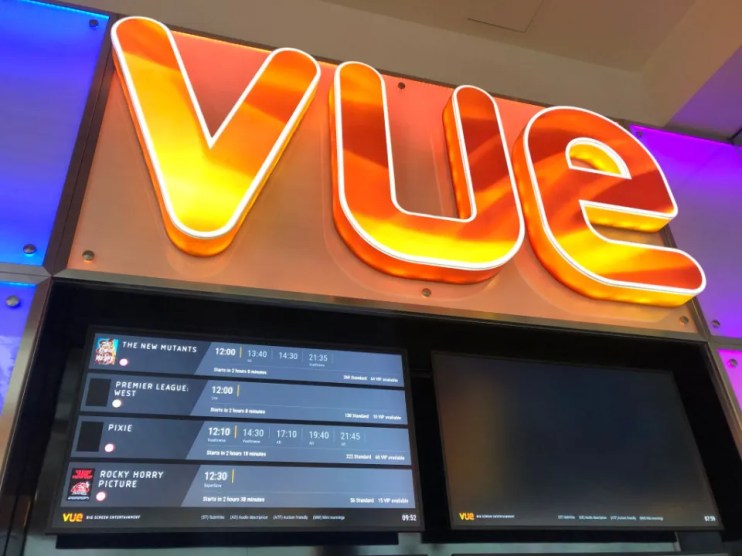Vue cinemas get box office boost as AI takes over its film scheduling

Cinema chain Vue has said using artificial intelligence (AI) to create “algorithm-driven film schedules” has helped to boost its admission numbers and profit.
The group, which has 88 cinemas across nine countries, said the new technology was introduced to help its UK cinemas identify the best times to show films in order to maximise ticket sales, with admissions in participating sites rising from 133.5m to just under 134m in the year ending November 30, 2023.
Vue said it planned to roll the software out to the rest of its portfolio, starting with its Italian venues, in 2024.
During the year the group’s total revenue increased to £759m, up from £606m in the 12 months before, with its pre-tax loss narrowing to £73.7m from £253m, according to newly-filed accounts.
Vue’s Italian sites saw the biggest upswing in visitors, with a 59 per cent increase in admissions to 69m visits and gross box office receipts of €490m (£413m) from €296m (£249m) in the year before.
Its Netherland’s sites saw the second largest increase, with a 37 per cent rise in admissions to just under 30m visits, driving gross box office receipts of €312m (£262m) from €216m (£181m).
In the UK admissions rose to almost 134m – an increase of 0.3 per cent – with gross box office receipts of just over £1bn.
During the year Vue also made major changes to its financial structuring, changing its parent company from a UK incorporated firm to the Jersey incorporated company Vue Entertainment International Limited in January 2023.
The group said that a debt-for-equity swap was implemented with approximately £470m of debt removed from its balance sheet.
Vue: Cinema ‘continued to recover’
In its 2023 annual report Vue said: “FY23 saw strong recovery in revenue, with adjusted EBITDA of £45.4m exceeding the FY23 budget and delivering a significant increase on FY22 adjusted EBITDA of £29m.
“Admissions increases from FY22 to FY23 were particularly strong in Italy and Netherlands.
“Covid-19 significantly affected the production of theatrical films and the associated lockdowns also
affected consumer demand from 2020 until the start of 2022.
“In addition, during this time, certain studios experimented with direct-to-streaming or ‘day and date’ (streaming / cinema same time).
“However, since then studios have returned to the standard theatrical window model. The film industry continued to recover post pandemic, with projected global box office for 2023 achieving 29 per cent growth on 2022 (Gower Street Analytics).
“The group experienced a continuous uplift in admissions through FY23 with Q3 FY23 being the
strongest quarter since Covid and with the business continuing to gain market share.
“Rare strike actions by SAG-AFTRA (Screen Actors Guild) and WGA (Writers Guild of America), halted
production for six months during 2023 having an impact on releases initially scheduled in Q4 FY23 due
to the lack of talent available for promotion with a continued impact through FY24.”

Are UK cinemas performing well?
Vue rival Everyman reported double digit revenue and profit growth during 2023, sending shares up over four per cent shortly after it released its results in April.
Revenue grew 15 per cent to £91m and pre-tax profit jumped nearly 12 per cent to over £16m. This was due to a rise in admission after hit movies last year including Barbie, Oppenheimer and Wonka.
The average food and drink spend per person rose from £9.34 in 2022 to £10.29 in 2023. Everyman, which opened six new sites last year, is set to open at least another three in 2024, in Bury St Edmunds, Stratford and Cambridge. It has a further four in the pipeline for 2025.
Meanwhile Odeon, the UK’s largest cinema chain, hit revenue of £200m in 2022, up from £136m in 2021. Its pre-tax loss decreased slightly to £30m from £31m in the year before. The group is yet to publish its results for 2023.
The sector as a whole benefitted from an increase in spending during 2023, with Barbie, Oppenheimer, The Super Mario Bros Movie, Killers of the Flower Moon, Wonka and screenings of Taylor Swift’s Eras tour helping to drive increased admissions.
However, Anatomy of a Fall failed to attract movie-goers, causing cinema spending to flop 29 per cent upon its release.